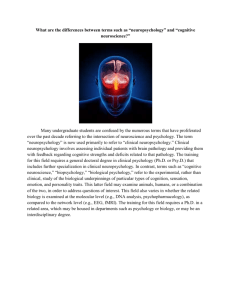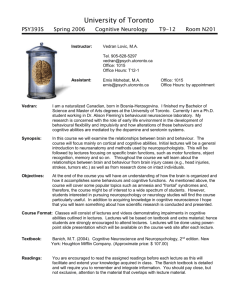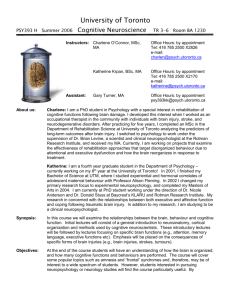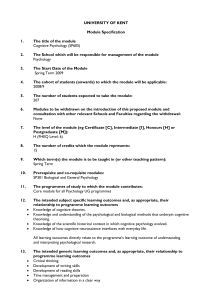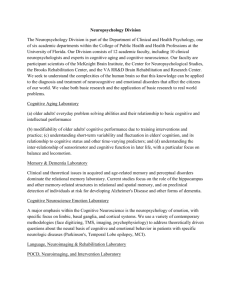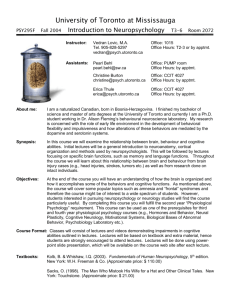syllabus psy393 2006summer - University of Toronto Mississauga
advertisement
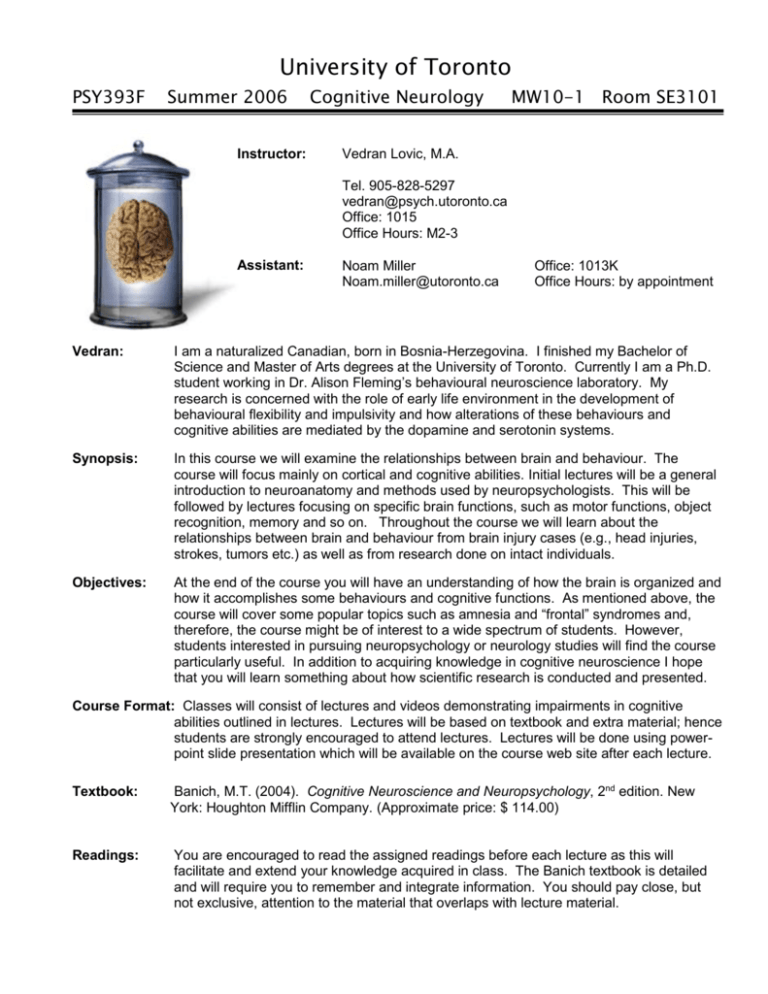
University of Toronto PSY393F Summer 2006 Instructor: Cognitive Neurology MW10-1 Room SE3101 Vedran Lovic, M.A. Tel. 905-828-5297 vedran@psych.utoronto.ca Office: 1015 Office Hours: M2-3 Assistant: Noam Miller Noam.miller@utoronto.ca Office: 1013K Office Hours: by appointment Vedran: I am a naturalized Canadian, born in Bosnia-Herzegovina. I finished my Bachelor of Science and Master of Arts degrees at the University of Toronto. Currently I am a Ph.D. student working in Dr. Alison Fleming’s behavioural neuroscience laboratory. My research is concerned with the role of early life environment in the development of behavioural flexibility and impulsivity and how alterations of these behaviours and cognitive abilities are mediated by the dopamine and serotonin systems. Synopsis: In this course we will examine the relationships between brain and behaviour. The course will focus mainly on cortical and cognitive abilities. Initial lectures will be a general introduction to neuroanatomy and methods used by neuropsychologists. This will be followed by lectures focusing on specific brain functions, such as motor functions, object recognition, memory and so on. Throughout the course we will learn about the relationships between brain and behaviour from brain injury cases (e.g., head injuries, strokes, tumors etc.) as well as from research done on intact individuals. Objectives: At the end of the course you will have an understanding of how the brain is organized and how it accomplishes some behaviours and cognitive functions. As mentioned above, the course will cover some popular topics such as amnesia and “frontal” syndromes and, therefore, the course might be of interest to a wide spectrum of students. However, students interested in pursuing neuropsychology or neurology studies will find the course particularly useful. In addition to acquiring knowledge in cognitive neuroscience I hope that you will learn something about how scientific research is conducted and presented. Course Format: Classes will consist of lectures and videos demonstrating impairments in cognitive abilities outlined in lectures. Lectures will be based on textbook and extra material; hence students are strongly encouraged to attend lectures. Lectures will be done using powerpoint slide presentation which will be available on the course web site after each lecture. Textbook: Banich, M.T. (2004). Cognitive Neuroscience and Neuropsychology, 2nd edition. New York: Houghton Mifflin Company. (Approximate price: $ 114.00) Readings: You are encouraged to read the assigned readings before each lecture as this will facilitate and extend your knowledge acquired in class. The Banich textbook is detailed and will require you to remember and integrate information. You should pay close, but not exclusive, attention to the material that overlaps with lecture material. University of Toronto PSY393F Summer 2006 Cognitive Neurology MW10-1 Room SE3101 Web Page: www.erin.utoronto.ca/~w3psy295/psy393.htm Login: psy393 Password: 20061 Grading: Term Test Short Assignment Final Exam Test/Exam: Term test/exam will be based on the material from the textbook, lectures and videos. The tests will consist of multiple-choice questions (~30%; based on Banich), matching questions (based on Banich and lectures) shorter and longer questions as well as a diagram requiring you to label brain parts (based on lectures, videos and textbook). The shorter and longer questions will require students to recite information but also integrate knowledge analytically. Please see question examples on the web. 35% 20% 45% Prerequisites: PSY201, PSY270/PSY290. Students from various backgrounds (cognitive psychology or physiological psychology) will have an equal opportunity to do well in the course. It is your responsibility to ensure that you have met all prerequisites listed in the UTM Calendar for this course. If you lack any prerequisites for this course, the Department may cancel your registration at anytime. Further information about academic regulations, course withdrawal dates and credits can be found in the University of Toronto Calendar. Make-ups: For this particular course, there will be NO make-up tests. If you miss one of the term tests without a legitimate excuse, you will receive a mark of zero for that term test. If you do have a legitimate excuse (e.g., doctor’s note; please see Calendar, Section 6), your final exam will be worth 80%. If you submit medical documentation make sure it contains the statement "This student was unable to write the test (or submit term work by the last day of classes, if applicable) on (date) for medical reasons". You are advised to see your physician within one day of the missed test. Many physicians will not provide documentation retroactively. Short Assignment: The purpose of this short paper is to further advance your knowledge of one of the topics covered in class (e.g., attention, memory, language etc.). You will achieve this by assessing a case study in conjunction with a general reading, related to the case study. General readings are provided on the course web page. You will find an appropriate case study on your own and have it approved by me through e-mail. Send me an e-mail with a link to your case study selection. You will summarize the case study’s findings, synthesize what these finding tell us about a particular function (e.g., memory), and explain how the findings fit into the broader context of the general reading (and the Banich textbook - optional). In addition, we would like to hear your opinions on these findings (questions, comments, criticisms etc.). Your paper will be graded on content (~65%) and style (~35 %). The paper should be written in APA style and 1500 to 2000 words in length (not including the cover page, abstract or the reference section). The paper is due June 21st, at the beginning of the class. Papers submitted after 10:15 will be considered late. Late penalty is 5% per day. The last day to hand in papers is June 23rd. E-mail copies of your paper will not be accepted. University of Toronto PSY393F Summer 2006 Cognitive Neurology MW10-1 Room SE3101 Reviews Motor Control Graziano, M. (2006). The organization of behavioral repertoire in motor cortex. Annual Reviews in Neuroscinece, 29, 105-134. Vision and Agnosias Farah, M.J. & Aguirre, G.K. (1999). Imaging visual recognition: PET and fMRI studies of the functional anatomy of human visual recognition. Trends in Cognitive Sciences, 3(5), 179-186. Attention and Neglect Hills, A.E. (2006). Neurobiology of unilateral spatial neglect. The Neuroscientist, 12(2), 153-163. Language and Aphasias Alexander, M.P. (1997). Aphasia: Clinical and anatomic aspects. In T.E. Feinberg & M.J. Farah (Eds.), Behavioral neurology and neuropsychology. New York: McGraw-Hill, pp. 133-149. Memory and Amnesias Squire, L.R., Stark, C.E.L., & Clark, R.E. (2004). The medial temporal lobe. Annual Reviews in Neuroscience, 27, 279-306. Executive Function Stuss, D.T. & Levin, B. (2002). Adult Clinical Neuropsychology: Lessons from Studies of the Frontal Lobes. Annual Review of Psychology, 53:401-433. Emotion Adolphs, R. (2003). Neural systems for recognizing emotion. Current Opinion in Neurobiology, 12, 169-177. University of Toronto PSY393F Summer 2006 Cognitive Neurology MW10-1 Room SE3101 Schedule of Lectures and Readings Date Topic Banich May 15 Introduction, Historical Background and Issues May 17 Neuroanatomy & Methods in Neuropsychology May 22 Holiday – No class May 24 Motor Control and Motor Disorders 5 May 29 Vision and Agnosias 6 May 31 Term Test (35%) June 5 Attention and Disorders of Attention 8 June 7 Language and Aphasias 9 June 12 Memory and Amnesias 10 June 14 Executive Function 11 June 19 Emotion 12 June 21 Generalized Cognitive Disorders (Paper Due) 14 June 26-30 Final Exam 45% (Non-cumulative) 1&3


